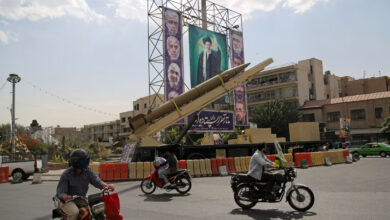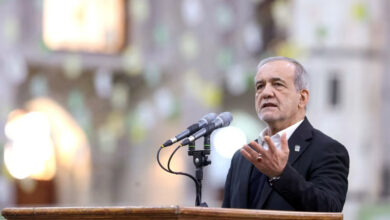Tehran– Iran on Tuesday warned its Arab neighbors in the Persian Gulf that the United States is trying to drive a wedge between them by ramping up its missile defense systems in the region.
The comments deepen tensions at a time when Iran faces possible new sanctions over its nuclear ambitions.
US military officials said over the weekend that the systems–involving upgraded Patriot missiles on land and more US Navy ships capable of destroying missiles in flight–is intended to counter a potential Iranian missile strike.
Iranian President Mahmoud Ahmadinejad met Tuesday with the crown prince of Qatar, one of four Arab nations where the US has based Patriot missile systems, and told him the West was seeking to divide them.
"Westerners do not want friendly relations between countries in the region. Their life is dependent on rifts and insecurity," the president told the visiting crown prince, Sheik Tamim bin Hamad Al-Thani, whose country hosts the largest US base in the Gulf.
"The enemies intend to extend the fire of war in the entire region to solve their own political and economic problems," state TV quoted Ahmadinejad as saying in their meeting.
Ahmadinejad said Iran and Qatar should build closer links and develop a common understanding of what he called plots by enemies.
The predominantly Sunni Arab Middle East–and Gulf nations in particular–have been wary of the growing influence of Shia Iran, especially because of international suspicions that its nuclear program has a military dimension.
The United States and its Western allies have been pushing for a fourth round of UN sanctions against Iran over its nuclear program, especially because it refuses to freeze its uranium enrichment program and belated revelations that it was building a secret fortified plant.
But with Russia, and especially China, skeptical of any new UN penalties, they have to tread carefully to maintain six power unity on how to deal with the Islamic Republic and recent meetings have not resulted in any agreements on sanctions.
Iran insists its nuclear work only has peaceful aims like energy production.
Iran’s missile program has also generated worries. Iran has missiles with ranges of more than 2000 km that are capable of hitting Israel and US bases in the region, as well as parts of southeastern and eastern Europe.
The US Patriot missile systems, which originally were deployed in the region to shoot down aircraft have now been upgraded to hit missiles in flight.
In a January speech, General David Petraeus, the US Central Command chief who is responsible for military operations across the Middle East, said the US now has eight Patriot missile batteries stationed in the Gulf region–two each in four countries. He did not name the countries.
A military official said over the weekend, however, that the countries are Kuwait, the United Arab Emirates, Bahrain and Qatar. The official spoke on condition of anonymity because some aspects of the defensive strategy are classified.
In another speech, Petraeus said Aegis ballistic missile cruisers are now in the Gulf at all times.
Iran’s parliament speaker, Ali Larijani, warned nations in the region not to be "deceived by US anti-Iran policies" and talk of a growing Iranian threat.
"When in the past 31 years has Iran attacked any of its neighboring states or any other countries in the region?" Larijani said, referring to the length of time that the country’s Islamic leadership has been in power.
Emphasizing the point, he noted that the 1980-88 war with Iraq was in defense against an attack launched by Saddam Hussein.
Larijani said the strengthening of the missile defense system would only bring more trouble for US forces.
"Regional countries should know that this puppet show by the US, while claiming to create security in the region, is nothing except a new political ploy to increase the (American) military presence at the expense of others," Larijani said in a parliament session.
Foreign Ministry spokesman Ramin Mehmanparast told reporters that Iran believes the US missile systems to be "ineffective," though he did not elaborate.




